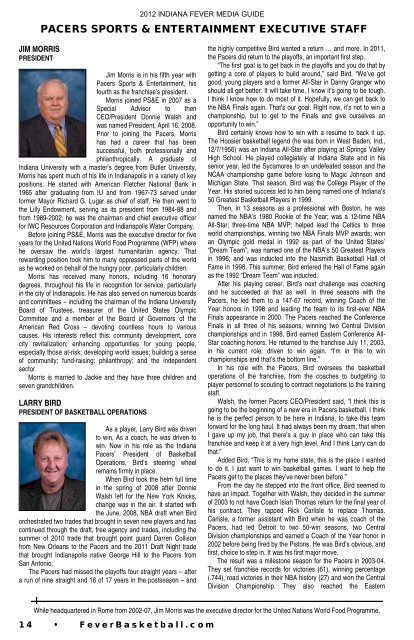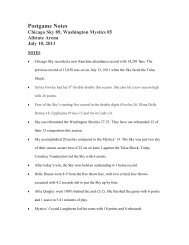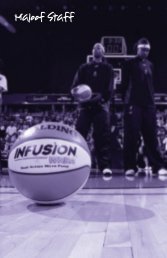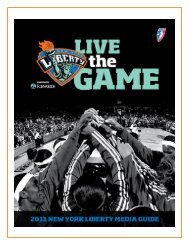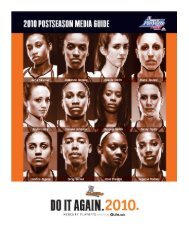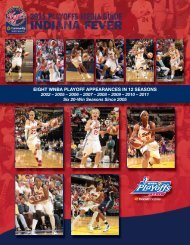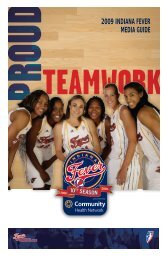You also want an ePaper? Increase the reach of your titles
YUMPU automatically turns print PDFs into web optimized ePapers that Google loves.
JIM MORRIS<br />
PRESIDENT<br />
<strong>2012</strong> INDIANA FEVER MEDIA GUIDE<br />
PACERS SPORTS & ENTERTAINMENT EXECUTIVE STAFF<br />
Jim Morris is in his fifth year with<br />
Pacers Sports & Entertainment, his<br />
fourth as the franchise’s president.<br />
Morris joined PS&E in 2007 as a<br />
Special Advisor to then<br />
CEO/President Donnie Walsh and<br />
was named President, April 16, 2008.<br />
Prior to joining the Pacers, Morris<br />
has had a career that has been<br />
successful, both professionally and<br />
philanthropically. A graduate of<br />
Indiana University with a master’s degree from Butler University,<br />
Morris has spent much of his life in Indianapolis in a variety of key<br />
positions. He started with American Fletcher National Bank in<br />
1965 after graduating from IU and from 1967-73 served under<br />
former Mayor Richard G. Lugar as chief of staff. He then went to<br />
the Lilly Endowment, serving as its president from 1984-88 and<br />
from 1989-2002, he was the chairman and chief executive officer<br />
for IWC Resources Corporation and Indianapolis Water Company.<br />
Before joining PS&E, Morris was the executive director for five<br />
years for the United Nations World Food Programme (WFP) where<br />
he oversaw the world’s largest humanitarian agency. That<br />
rewarding position took him to many oppressed parts of the world<br />
as he worked on behalf of the hungry poor, particularly children.<br />
Morris has received many honors, including 16 honorary<br />
degrees, throughout his life in recognition for service, particularly<br />
in the city of Indianapolis. He has also served on numerous boards<br />
and <strong>com</strong>mittees – including the chairman of the Indiana University<br />
Board of Trustees, treasurer of the United States Olympic<br />
Committee and a member of the Board of Governors of the<br />
American Red Cross – devoting countless hours to various<br />
causes. His interests reflect this: <strong>com</strong>munity development, core<br />
city revitalization; enhancing opportunities for young people,<br />
especially those at-risk; developing world issues; building a sense<br />
of <strong>com</strong>munity; fund-raising; philanthropy; and the independent<br />
sector.<br />
Morris is married to Jackie and they have three children and<br />
seven grandchildren.<br />
LARRY BIRD<br />
PRESIDENT OF BASKETBALL OPERATIONS<br />
As a player, Larry Bird was driven<br />
to win. As a coach, he was driven to<br />
win. Now in his role as the Indiana<br />
Pacers’ President of Basketball<br />
Operations, Bird’s steering wheel<br />
remains firmly in place.<br />
When Bird took the helm full time<br />
in the spring of 2008 after Donnie<br />
Walsh left for the New York Knicks,<br />
change was in the air. It started with<br />
the June, 2008, NBA draft when Bird<br />
orchestrated two trades that brought in seven new players and has<br />
continued through the draft, free agency and trades, including the<br />
summer of 2010 trade that brought point guard Darren Collison<br />
from New Orleans to the Pacers and the 2011 Draft Night trade<br />
that brought Indianapolis native George Hill to the Pacers from<br />
San Antonio.<br />
The Pacers had missed the playoffs four straight years – after<br />
a run of nine straight and 16 of 17 years in the postseason – and<br />
14 • FeverBasketball.<strong>com</strong><br />
the highly <strong>com</strong>petitive Bird wanted a return … and more. In 2011,<br />
the Pacers did return to the playoffs, an important first step.<br />
“The first goal is to get back in the playoffs and you do that by<br />
getting a core of players to build around,” said Bird. “We’ve got<br />
good, young players and a former All-Star in Danny Granger who<br />
should all get better. It will take time, I know it’s going to be tough.<br />
I think I know how to do most of it. Hopefully, we can get back to<br />
the NBA Finals again. That’s our goal. Right now, it’s not to win a<br />
championship, but to get to the Finals and give ourselves an<br />
opportunity to win.”<br />
Bird certainly knows how to win with a resume to back it up.<br />
The Hoosier basketball legend (he was born in West Baden, Ind.,<br />
12/7/1956) was an Indiana All-Star after playing at Springs Valley<br />
High School. He played collegiately at Indiana State and in his<br />
senior year, led the Sycamores to an undefeated season and the<br />
NCAA championship game before losing to Magic Johnson and<br />
Michigan State. That season, Bird was the College Player of the<br />
Year. His storied success led to him being named one of Indiana’s<br />
50 Greatest Basketball Players in 1999.<br />
Then, in 13 seasons as a professional with Boston, he was<br />
named the NBA’s 1980 Rookie of the Year; was a 12-time NBA<br />
All-Star; three-time NBA MVP; helped lead the Celtics to three<br />
world championships, winning two NBA Finals MVP awards; won<br />
an Olympic gold medal in 1992 as part of the United States’<br />
“Dream Team”; was named one of the NBA’s 50 Greatest Players<br />
in 1996; and was inducted into the Naismith Basketball Hall of<br />
Fame in 1998. This summer, Bird entered the Hall of Fame again<br />
as the 1992 “Dream Team” was inducted.<br />
After his playing career, Bird’s next challenge was coaching<br />
and he succeeded at that as well. In three seasons with the<br />
Pacers, he led them to a 147-67 record, winning Coach of the<br />
Year honors in 1998 and leading the team to its first-ever NBA<br />
Finals appearance in 2000. The Pacers reached the Conference<br />
Finals in all three of his seasons, winning two Central Division<br />
championships and in 1998, Bird earned Eastern Conference All-<br />
Star coaching honors. He returned to the franchise July 11, 2003,<br />
in his current role, driven to win again. “I’m in this to win<br />
championships and that’s the bottom line.”<br />
In his role with the Pacers, Bird oversees the basketball<br />
operations of the franchise, from the coaches to budgeting to<br />
player personnel to scouting to contract negotiations to the training<br />
staff.<br />
Walsh, the former Pacers CEO/President said, “I think this is<br />
going to be the beginning of a new era in Pacers basketball. I think<br />
he is the perfect person to be here in Indiana, to take this team<br />
forward for the long haul. It had always been my dream, that when<br />
I gave up my job, that there’s a guy in place who can take this<br />
franchise and keep it at a very high level. And I think Larry can do<br />
that.”<br />
Added Bird, “This is my home state, this is the place I wanted<br />
to do it. I just want to win basketball games. I want to help the<br />
Pacers get to the places they’ve never been before.”<br />
From the day he stepped into the front office, Bird seemed to<br />
have an impact. Together with Walsh, they decided in the summer<br />
of 2003 to not have Coach Isiah Thomas return for the final year of<br />
his contract. They tapped Rick Carlisle to replace Thomas.<br />
Carlisle, a former assistant with Bird when he was coach of the<br />
Pacers, had led Detroit to two 50-win seasons, two Central<br />
Division championships and earned a Coach of the Year honor in<br />
2002 before being fired by the Pistons. He was Bird’s obvious, and<br />
first, choice to step in. It was his first major move.<br />
The result was a milestone season for the Pacers in 2003-04.<br />
They set franchise records for victories (61), winning percentage<br />
(.744), road victories in their NBA history (27) and won the Central<br />
Division Championship. They also reached the Eastern<br />
While headquartered in Rome from 2002-07, Jim Morris was the executive director for the United Nations World Food Programme.


